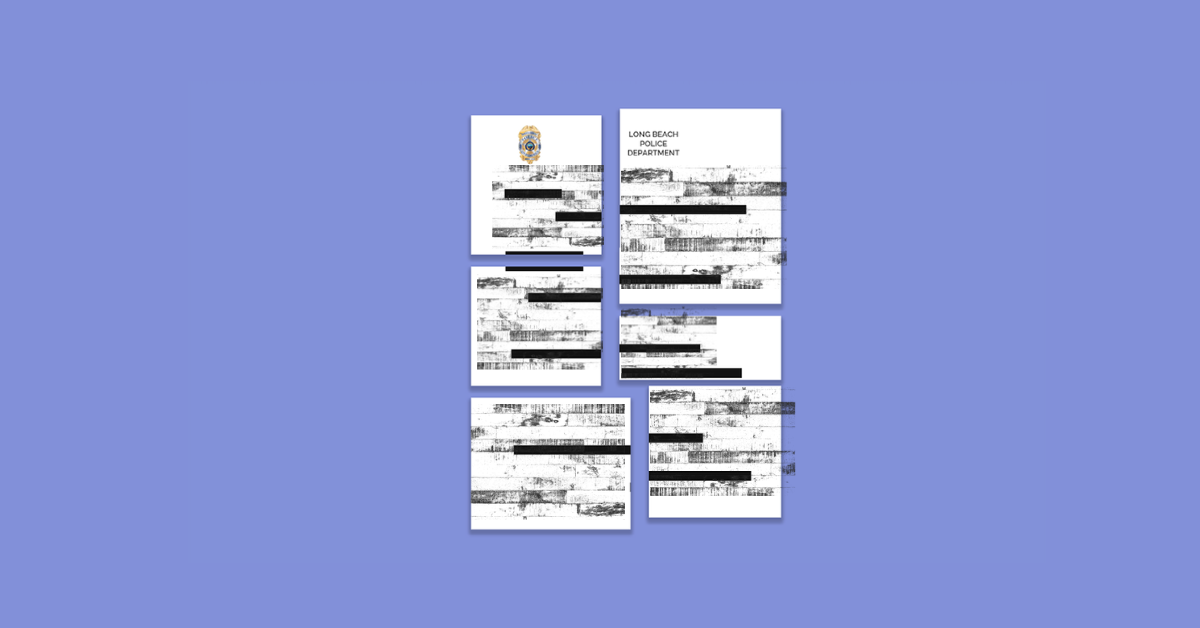Emails Show LBPD Brass Circulated Advice From Outside Attorneys Encouraging Records Purge Ahead of 2019 Transparency Law
6 minute readIn late 2018, just before a state law took effect that would give the public unprecedented access to police misconduct and use-of-force records, Long Beach police senior staff were circulating recommendations from outside attorneys encouraging law enforcement agencies to purge documents in anticipation of an onslaught of public records requests, according to emails we obtained.
This publication first reported in December 2018 that the City Council quietly approved the Long Beach Police Department’s request to destroy a 23-year backlog of internal affairs records and use-of-force-reviews two weeks before SB 1421 was implemented.
While the department was no longer legally required to retain the records it destroyed, critics of the move said it violated the spirit of SB 1421 and resulted in the loss of evidence that may have been useful in future court cases.
At the time, Cmdr. Erik Herzog, who has since been promoted to deputy chief, told us that the records destruction was unrelated to the forthcoming police transparency law, instead saying that it was part of a long-planned citywide effort to free up space.
“I get with the other stories that are coming out, [some might ask] ‘Is it related to [Senate Bill] 1421 or not?’ and it’s not,” Herzog said in 2018.
The police department still maintains that position, saying that the records had been “marked for destruction” months before they were aware that the law was going to be signed by the governor. This was a common refrain used by police departments across the state when asked about records destruction that occurred just prior to the law taking effect.
Now, police emails obtained by FORTHE Media show that LBPD leadership was aware of SB 1421’s potential to bring old internal affairs records to light and were circulating advice from outside attorneys to cull those records in the months before the law went into effect.
On Oct. 1, 2018, LBPD Chief Robert Luna forwarded an email to senior staff members in the department, including Herzog, that contained a message from Scott Tiedemann, the general counsel to the Los Angeles County Police Chiefs Association.
“SB 1421 will take effect January 1, 2019, so departments have a relatively limited amount of time to make and implement important decisions about what records to retain/disclose,” Tiedemann wrote.
Luna added his own message to the email: “We need to meet and put together a plan.”
According to LBPD spokesperson Allison Gallagher, that plan referred to “how the department would adapt to meet the unfunded SB 1421 mandate” and that any suggestion that the records destruction was prompted by SB 1421 was an “improper and irresponsible conclusion.”
Two weeks later, Internal Affairs Cmdr. Lloyd Cox shared with Luna a “client alert” from an outside law firm warning police departments that SB 1421 would apply retroactively and that police departments should lawfully get rid of as many records as possible before they could be made public.
“Not sure if you receive these updates,” Cox wrote in the email to Luna with the client alert attached to it.
The document was from Ferguson, Praet & Sherman, a law firm that the city has previously contracted to represent an officer in a civil lawsuit.
“We continue to encourage agencies to timely purge those records not pending litigation or otherwise needing to be retained for some other legitimate reason,” the client alert stated. “Remember: While there is likely a court which could require you to produce records you retain, no court can require you to produce those records you’ve lawfully purged.”
That December, a request to make numerous changes to the LBPD’s records retention schedule came before the City Council for a rubber stamp. Among those changes was to significantly shorten the length of time the department had to hold on to records related to sustained complaints of police misconduct from indefinitely to five years after a case is closed.
This rule change—which was in alignment with state law—opened the door for some of the decades-old records to be shredded the following week.
Tomisin Oluwole
Coquette
Acrylic on canvas
18 x 24 inches
Click here to check out our interview with Tomisin Oluwole, a a literary and visual artist based in Long Beach.

Instead of gunking up our site with ads, we use this space to display and promote the work of local artists.
On Dec. 18, 2018, the City Council unanimously approved a request from the LBPD to destroy Internal Affairs documents that spanned from 1978 to 2001 without any discussion of SB 1421.
It’s unknown exactly what was contained in the records that were destroyed since the department did not provide a tally, though Gallagher claims that police staff thumbed through records before they were destroyed to make sure none were releasable under SB 1421.
But at the time, Herzog told us something different. He said that documents pertaining to sexual assaults and untruthfulness by officers—which would have been disclosable under SB 1421—could have been among the shredded records but that there was no way to know since the department didn’t track those types of cases.
Backlash to news that the LBPD—as well as Inglewood police—had destroyed internal affairs records began to arrive in Luna’s email inbox by late 2018.
On New Year’s Eve—hours before SB 1421 was set to go into effect—then-LA County Dist. Atty. Jackie Lacey blasted out a letter to police chiefs and sheriffs in her jurisdiction urging them to stop purging records.
“If you have not destroyed your records I would strongly encourage you to retain them. These records may be subject to disclosure under SB 1421 which will become law January 1, 2019,” Lacey wrote in the letter, which was included in the cache of emails we obtained.
She went on to write that information in old police misconduct investigatory files could be discoverable in court and could aid in resolving wrongful conviction claims.
“In as much as there will be litigation on whether SB 1421 is retroactive, it is my opinion that it would be prudent to suspend plans to destroy records,” Lacey wrote.
But by then, it was too late for Long Beach.
On the same day, LA County Public Defender Ricardo D. Garda sent a letter to Luna asking that the LBPD cease and desist any further police records destruction.
“As there are many pending cases for which we will be requesting disclosure of information pursuant to SB 1421 , I request that you ensure there be no further destruction of such documents by your agency regardless of the age of such documents,” he wrote.
A few days later, posters decrying the records destruction were found at Wardlow Park and outside the offices of various councilmembers.
Herzog circulated a photo of one of the posters among police brass, according to the emails. He characterized them as “anti-LBPD” and included a description of the person who affixed them, calling her a “suspect.”
Even before the internal police emails came to light, there had been suspicion among community advocates that the LBPD had destroyed the records in anticipation of SB 1421 and to avoid disclosure of documents pertaining to officer misconduct .
“It’s pretty ironic that literally two weeks before [Senate Bill 1421] goes into effect [the LBPD] decides to make an unprecedented request to discard 23 years of documentation regarding complaints against them,” Dawn Modkins, a co-founder and organizer for Black Lives Matter Long Beach, told us in 2018. “Our history is being erased again.”
You can view the cache of emails, which span between June 2018 and August 2019, at this link.



 kevin@forthe.org
kevin@forthe.org @reporterkflores
@reporterkflores




